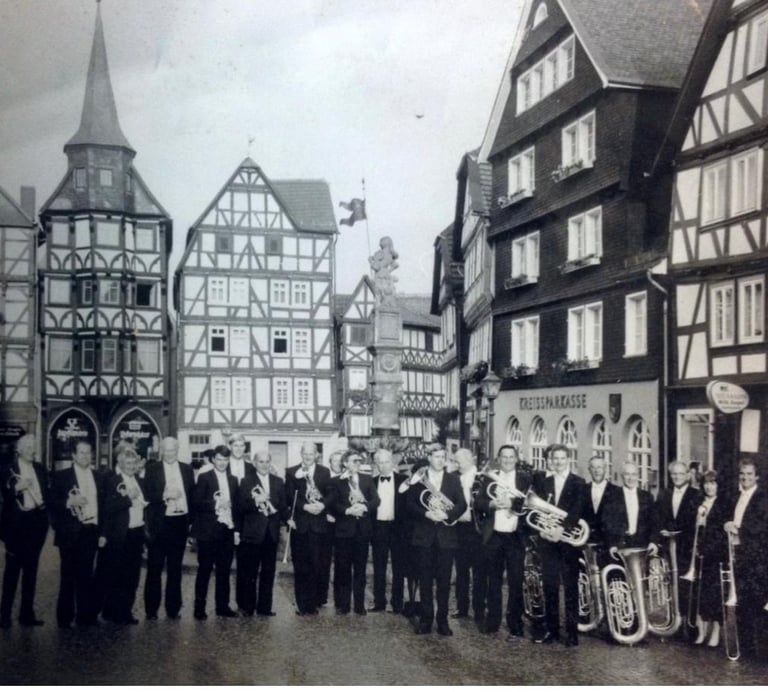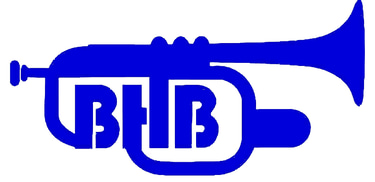Burnham & Highbridge Band, a History
In 1952 the band entered its first contest at Exeter, conducted by Mr Stan Evans of Bridgwater. It gained fourth place from an entry of twenty bands. At around that time Mr John Brown became non-playing secretary to the band. An officer of the South West Brass Bands Association, John was often to be seen marching in front of the band at summer parades and winter carnivals. From these early beginnings at Exeter the band, subsequently under the baton of Mr W.S.(Tommy) Farr, Peter Vann and others, climbed through the contesting sections and by the 1960s was competing in the second section nationally and in the South West Championship section.
During the 1980s, Burnham and Highbridge Brass Band embarked on three concert tours to Germany, fostering international musical exchanges.
After many happy and successful years under his direction the band lost Mr Farr permanently due to ill health but was able to appoint Mr Eric Heath who remained musical director almost continuously until 2006 when David Fisher took leadership of the band.


More recently the band has concentrated its efforts towards concerts rather than contesting and is in constant demand for a variety of different concert situations. Over recent years we have carried out regular outdoor engagements in Bath, Clevedon, Burnham on Sea, Street, Taunton, Weston super Mare and Wells. Amongst our charity concerts have been the RNLI, BARB, Lions, The Round Table, St Margaret’s Hospice, Winscombe Millennium Green, Alzheimer’s Association, and various charities supported by the Mayor and Mayoress of Burnham and Highbridge.
We aim to maintain an ever-rolling programme of music so that regular audiences enjoy a fresh selection of pieces each time they hear us. This approach also adds a challenge for the musicians and makes rehearsals interesting and enjoyable.
Our present MD, Felicity Day, joined us shortly before the Covid Pandemic and has helped to build the band since.
The band is always eager to engage new members and no matter what level of experience you have, a warm welcome is assured you. We are only a few minutes away from the M5 motorway Junction 22.
In 2025 the Burnham and Highbridge Band celebrates its Oaken Jubilee. The band was originally formed at the end of hostilities in Europe and consisted largely of ex-servicemen playing a variety of musical instruments, not necessarily brass.
As a result of keen interest shown by local people and businessmen the band rapidly expandedand by 1947 had become a full brass ensemble, when it was given official status by the then Urban District Council.
The band has continued to provide music for the people of Burnham and Highbridge and indeed to a much wider audience continuously since.
The Tradition of Brass Bands


Brass bands have played a significant role in British musical culture for over two centuries. Their origins can be traced back to the early 19th century, when industrialization led to the formation of community-based musical groups, particularly in coal mining and mill towns. The development of brass instruments with improved valves allowed for greater musical versatility, making them ideal for ensemble playing.
The rise of brass bands was closely linked to the growth of industry. Many factories and mines established bands as a way to provide workers with a recreational outlet and foster community spirit. Competitions became a major feature of brass band culture, with events such as the British Open Brass Band Championship (first held in 1853) attracting enthusiastic participation.
During the late 19th and early 20th centuries, brass bands gained widespread popularity across the UK. They were supported by wealthy industrialists, religious institutions, and trade unions, which saw them as a means of promoting discipline and unity. The Salvation Army, for example, became well known for its brass bands, using music to support its evangelical mission, and many current players have a Salvation Army or military background.
The interwar and post-war years saw brass bands continue to thrive, and the National Brass Band Championship of Great Britain, established in 1945, became a prestigious competition, further elevating the status of brass bands.
In the latter half of the 20th century, brass band music evolved beyond traditional marches and hymns to incorporate a wider repertoire, including classical adaptations, jazz, and current popular music. The influence of composers such as Edward Elgar and more recently Philip Sparke, John Barry, Elton John & Lloyd-Webber for example helped diversify the music and reach a larger audience.


Today, brass bands remain a cherished part of British musical heritage, with ensembles ranging from local community bands to elite championship groups. They continue to perform at major events, including national celebrations, fetes, flower shows, steam fairs Remembrance Day ceremonies, Oktoberfests, Christmas carol services and international contests. The brass band tradition is now more inclusive than ever, with youth bands ensuring its future remains bright.
Somerset, like many counties, has a rich brass band heritage, with local ensembles playing an integral role in community life. Towns such as Wells, Burnham-on-Sea and Weston-super-Mare have hosted vibrant brass band scenes, contributing to regional competitions and fostering musical talent.
Somerset’s brass band scene has contributed to the broader musical landscape of the county, which is also known for its folk and classical traditions. Today, brass bands in Somerset continue to thrive, performing at local festivals, competitions, and community gatherings, keeping the tradition alive for future generations.
© 2025. All rights reserved.
